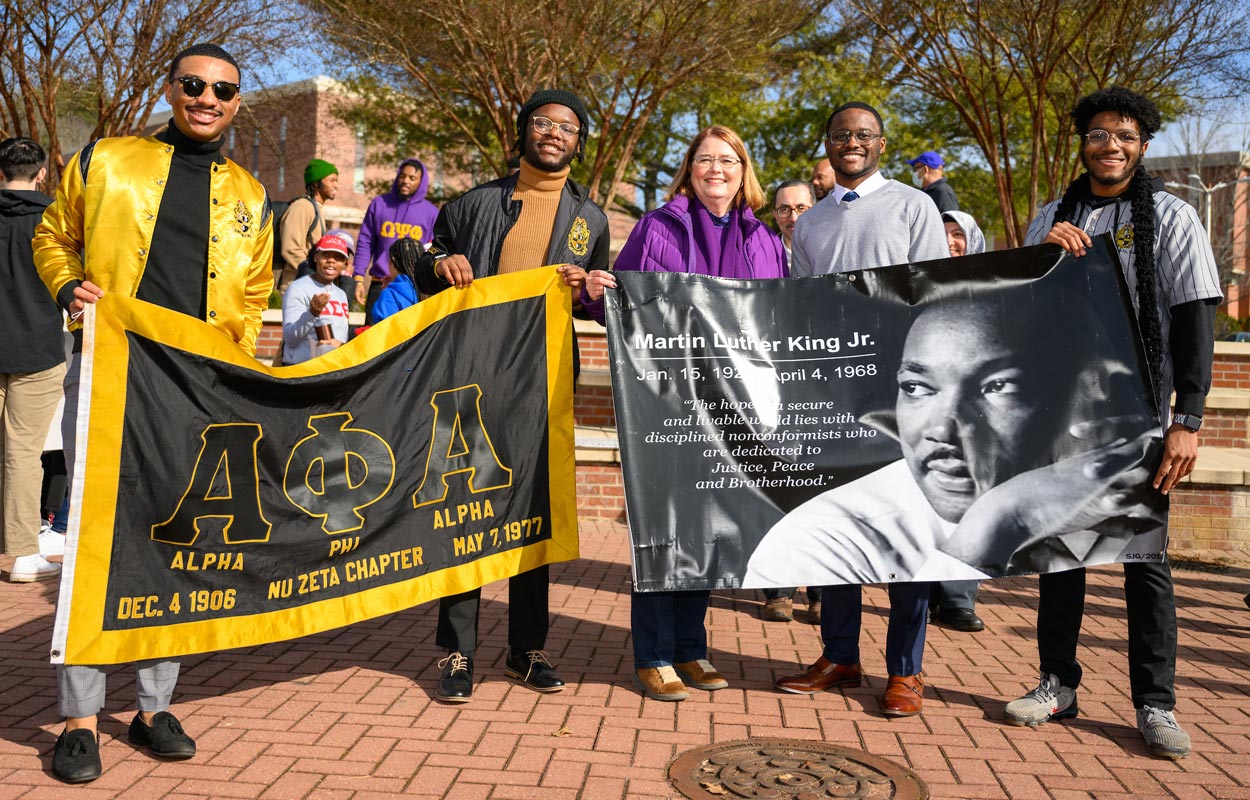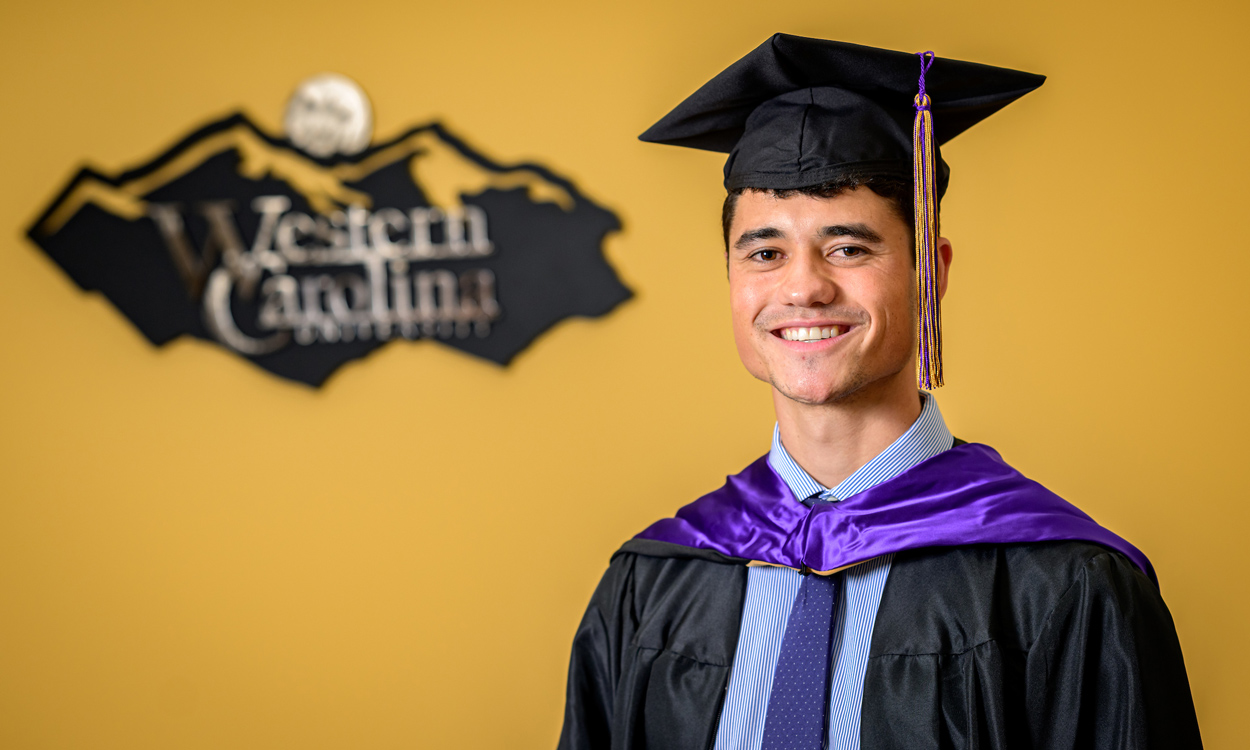Chancellor reinforces desire to address compensation issues at campus forum
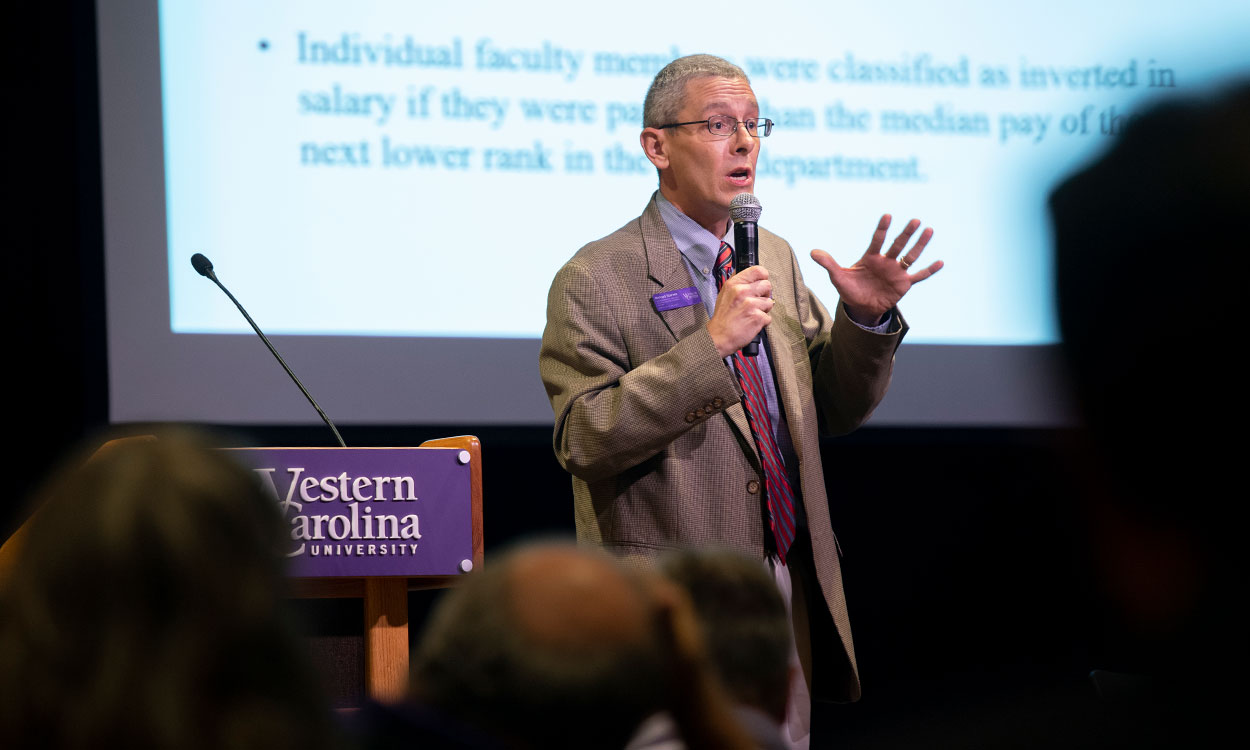
Richard Starnes, WCU's interim provost, speaks to nearly 200 attendees who gathered at a public forum addressing faculty and staff salaries.
Chancellor Kelli R. Brown reinforced her commitment to seek salary increases for Western Carolina University employees after hearing firsthand of the struggles many faculty and staff members face trying to make ends meet following years without meaningful raises combined with the increasing costs of benefits, inflation and living expenses.
“I have seen some of the salaries at this campus. It disheartens me to think that folks are working as hard as they are and for the number of years that they have at the salaries that they are making. It really disheartens me,” Brown said.
“It is very helpful for me to hear you today, and I will tell you the last three months and nine days I have been on campus, I have been listening. I have heard about the fatigue. I have heard about the anger. I have heard about the morale issues. I want you to know that I am taking this very seriously,” she said.
Brown’s remarks closed a nearly two-hour public forum on the topic of faculty and staff salaries hosted by Faculty Senate and Staff Senate on Wednesday, Oct. 9, in A.K. Hinds University Center. The event, originally scheduled for the UC theater, was moved to the Grandroom in anticipation of larger-than-anticipated turnout. Approximately 200 people attended the forum.
During the gathering, Brown reiterated that she would keep faculty and staff compensation as a legislative priority for the university and for her administration, a pledge she first made at her inaugural campus forum in September.
“This is not going to change overnight, folks. This has been going on a long time,” she said. “As I have said, this will be a marathon, not a sprint. But I am committed to making this a long-term priority, and I want to make sure we are addressing this on a regular basis.”
The goal of the salary forum was for WCU faculty and staff to get information about salary terminology, the budget process and the history of budget decisions that have shaped the current salary landscape, said Enrique Gomez, chair of the Faculty Senate, who facilitated the discussion.
Gomez opened the forum with an interactive question-and-answer session, encouraging members of the audience to respond via mobile device to multiple-choice questions on topics related to faculty salary compression and salary inversion, and expected preferences for the expenditure of increased recurring funds from the perspectives of a faculty member, a dean and a legislator. LINK TO PRESENTATION
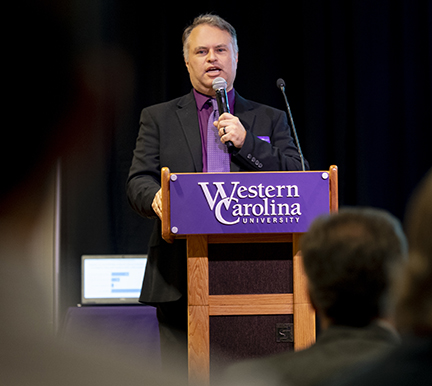
Faculty Senate Chair Enrique Gomez holds an interactive question-and-answer session with the audience.
For example, on the issue of salary inversion (which occurs when a full professor earns less than the median salary for an associate professor in the same field of study because starting salaries for newer faculty members have increased while salaries for existing faculty members are stagnant), Gomez said that 10 full professors at WCU fall into that situation.
“All these answers are really wrong, because if we were fair, the correct answer should be zero,” he said. “These are people who are full professors. These are people who have invested in our institution. They have demonstrated that they bring assets to the institution and they have helped this university grow.”
Following the interactive portion of the program, Gomez turned the microphone over to a panel of WCU administrators made up of Mike Byers, vice chancellor for administration and finance; Cory Causby, associate vice chancellor for human resources; and Richard Starnes, interim provost.
Byers shared information about the various sources of university funding that come from students and parents in the form of tuition, fees and rates; and from state appropriations, including dollars for enrollment growth, capital projects and legislatively approved salary increases. He then discussed the limited options the university has available to address faculty and staff compensation. LINK TO PRESENTATION
“The best way is if the Legislature allocates additional appropriations to us for salary increases,” he said, which could take the form of cost-of-living adjustments or raises based on merit. “That’s the best way because it doesn’t require you to have a trade-off. It might require the Legislature to have a trade-off, but it doesn’t require Western to do so.”
On the subject of trade-offs, other options to increase compensation require WCU to make tough decisions, Byers said. For example, enrollment growth funding could be used for salary increases instead of for adding new faculty and staff, he said, or the university could look to cut expenses in certain programs or activities to help fund raises for faculty and staff.
Causby followed Byers with a primer on salary guidelines and benchmarks, then provided a look at historical allocations for salary increases at WCU in recent years. LINK TO PRESENTATION Since 2010, the average legislative salary increase to WCU employees is 0.54 percent annually, he said. (Any potential increases for 2019 remain unknown as a state budget has not yet been approved.) By way of comparison, the average salary increase from 2000 to 2009 was 2.75 percent, he said.
Causby also reminded the attendees that WCU has attempted to address some of the compensation issues by incrementally implementing a five-step plan recommended by a university salary task force formed in 2013. Since 2013, the university has spent a total of $4.24 million on salary increases, he said.
“At that point in time, we had positions that were significantly below market rate. This was designed to start targeting those positions and bring people closer to market. It was designed to provide the most benefit to those folks who had the salaries that were the least competitive or farthest from the market rate,” he said. “Is it enough? It’s obviously never enough, but it’s important to understand that there are plans in place, and this will always continue to be a huge priority for this institution.”
Starnes, who became WCU’s interim provost on Oct. 1, opened his segment of the program with a bit of humor. “So it’s Day 9 with me as interim provost and here I stand before you to talk about salaries. Please don’t throw anything,” he said. LINK TO PRESENTATION
Starnes self-admittedly sped through his presentation in an effort to leave time for questions and comments from the audience, focusing his comments on a Faculty Senate resolution aimed at implementing corrective adjustments for faculty salaries through the tenure and promotion process. During the development of that resolution, Starnes discovered that the increases for progressing from assistant to associate professor and from associate to full professor have been in place since at least the early 1990s.
“In essence, the amounts have been the same for a generation,” he said. “So, when we talk about these kinds of questions and how do we address issues of compression and inversion, one of the important things to remember is we didn’t get here today. We didn’t get here a week ago. This is something that has been developing over time, and it will take us a little while to untangle.”
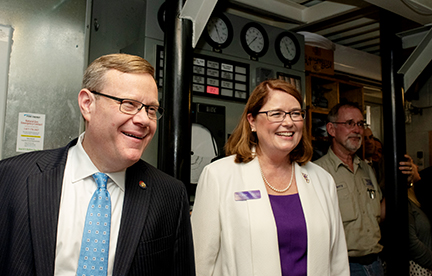
Tim Moore (left), North Carolina speaker of the house, tours the campus with WCU Chancellor Kelli Brown.
The salary forum follows on the heels of a campus visit last week by Tim Moore, North Carolina speaker of the house, as part of a statewide tour of University of North Carolina System institutions designed to help drum up support for an end to the state’s budget stalemate.
In addition to pledging his support for providing WCU with the remaining $16.5 million in state funding needed to replace the university’s aging steam plant, which provides heat and hot water to the majority of campus, Moore also discussed the need to address faculty and staff salary issues as part of the ongoing state budget negotiations. He said he supported additional funding to address salaries of UNC System employees beyond the 0.5 percent increase that is currently in the budget proposal.
Moore and university officials also visited with students in a forensic science lab, viewed progress on construction of the Connect NC bond-funded Apodaca Science Building, and toured Moore (no relation) Hall, which is atop WCU’s list of potential repair and renovation projects if state funding is made available.
